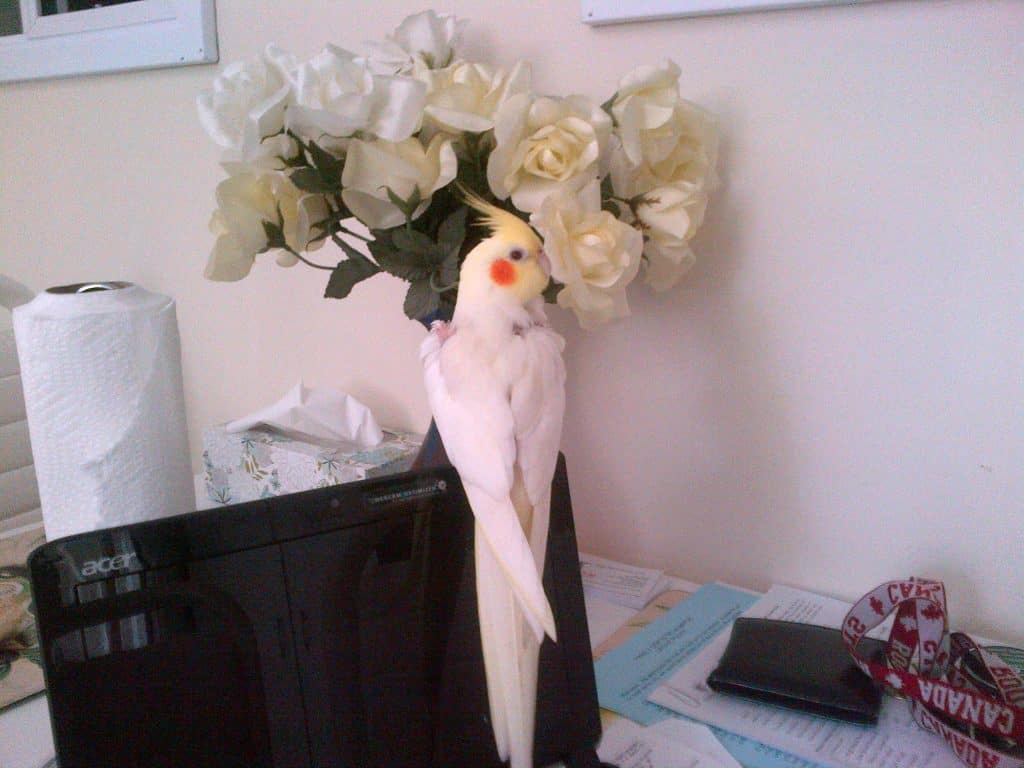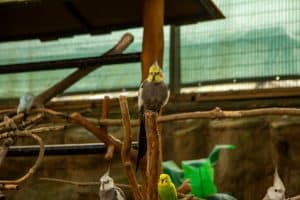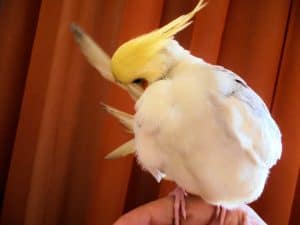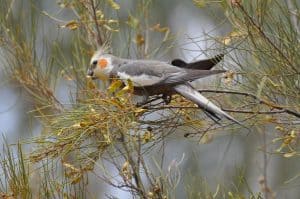Curious about how long do cockatiels live in captivity? Whether you’re thinking about bringing one of these delightful birds into your home or simply want to learn more about them, knowing their lifespan is crucial. With their unique crests and captivating personalities, cockatiels are among the most beloved pet birds around the globe.
Knowing the lifespan of cockatiels can help you prepare for the commitment they require. These birds aren’t just a short-term companion; with proper care, they can be part of your family for many years. Let’s dive into what influences their lifespan and how you can ensure a healthy, happy life for your cockatiel.
Understanding the Lifespan of Cockatiels
Cockatiels, as delightful pets, possess lifespans that vary significantly depending on whether they live in captivity or in the wild. Learning about this distinction helps you prepare to provide the best care possible for your feathered friend.
Average Lifespan in Captivity vs. Wild
Cockatiels typically enjoy a longer life in captivity, where they’re protected from predators and harsh environments. In captivity, an average cockatiel’s lifespan ranges from 15 to 20 years. This longevity is contingent on receiving good care, including a nutritious diet and regular veterinary check-ups.
Conversely, cockatiels in the wild face numerous challenges that reduce their lifespan, usually living around 10 to 15 years. Factors like predation, disease, and food scarcity play significant roles in their shorter lifespans.
Factors Influencing Lifespan
Several factors influence how long cockatiels live, and understanding these can help you maximize your pet’s lifespan. First, a nutritionally balanced diet consisting of high-quality pellets, fresh fruits, and vegetables is crucial for a healthy cockatiel.
Furthermore, regular visits to a good avian vet for health screenings and vaccinations can prevent many diseases that might shorten a cockatiel’s life. Lastly, the environment plays a pivotal role; a safe, spacious cage and a stress-free home environment with opportunities for mental and physical exercise can contribute significantly to extending a cockatiel’s lifespan.
Factors Influencing Lifespan
Several factors influence how long cockatiels live, and understanding these can help you maximize your pet’s lifespan. First, a nutritionally balanced diet consisting of high-quality pellets, fresh fruits, and vegetables is crucial for a healthy cockatiel.
Furthermore, regular visits to a good avian vet for health screenings and vaccinations can prevent many diseases that might shorten a cockatiel’s life. Lastly, the environment plays a pivotal role; a safe, spacious cage and a stress-free home environment with opportunities for mental and physical exercise can contribute significantly to extending a cockatiel’s lifespan.
Key Aspects of Cockatiel Care
Optimal care boosts the likelihood of your cockatiel reaching the upper end of their lifespan, ensuring many years of companionship. Here are some pivotal aspects of cockatiel care that can significantly influence their health and longevity.
Importance of Diet
A well-balanced diet is crucial for maintaining your cockatiel’s health and can dramatically extend its lifespan. Include high-quality pellets, which should compose about 60-70% of their diet. Fresh fruits and vegetables contribute vitamins and minerals, enhancing overall health, while occasional treats of seeds are enjoyable but should be given sparingly due to their high fat content.
Avoid foods like avocado, chocolate, and caffeine, as these can be toxic to birds. Proper feeding not only supports a healthy cockatiel but also wards off nutritional deficiencies that could shorten its lifespan.
Exercise and Enrichment
Cockatiels need regular exercise and mental stimulation to stay healthy. Providing a spacious cage for flying and activities, along with time outside the cage in a safe, enclosed environment, allows your cockatiel to stretch its wings and exercise its muscles.
Enrichment can include interactive toys, puzzles, and social interaction with you. Engagement helps prevent stress and boredom, which can lead to behavioral and health issues. Ensuring your feathered friend stays active is a vital part of their overall care regimen.
Regular Veterinary Visits
Routine check-ups with a good avian vet are essential for maintaining your cockatiel’s health. These visits can help catch and treat potential health issues before they become severe. Regular screenings for common conditions that affect birds, advice on diet, and preventive care are all part of a vet’s role in your cockatiel’s life. Additionally, vets can provide valuable tips on proper care and any necessary adjustments to diet or environment based on your specific bird’s needs.
Recognizing the Signs of an Aging Cockatiel
As your cockatiel ages, certain physical and behavioral changes become evident, signaling that your feathered friend is entering its senior years. Recognizing these signs helps you provide the necessary care to maintain your cockatiel’s health and comfort.
Physical Changes
Observing your cockatiel regularly, you’ll notice several physical signs of aging. Their feathers may begin to lose luster or appear thinner, and their eyes might look cloudier than before. Additionally, an aging cockatiel often experiences changes in its beak, nails, and skin condition. If the beak or nails seem overly long or the skin appears excessively flaky, these could be indicative of age-related health issues.
Behavioral Adjustments
Behavioral changes are also common as cockatiels age. Your pet might show less interest in interaction or play, preferring to rest more. Changes in vocalization patterns could occur, with your cockatiel either vocalizing less or more softly than usual. If you notice a decrease in activity levels or significant changes in daily routines, consider these as signs of your cockatiel’s advancing age.
Health Indications
Aging may bring about more frequent or severe health issues. Watch for signs of discomfort, such as reluctance to move or difficulty perching, which can suggest joint pain or arthritis. Regular check-ups with a good avian vet become crucial at this stage, as they can help manage any developing health problems and ensure that dietary adjustments meet the nutritional needs of your aging cockatiel.
Behavioral Adjustments
Behavioral changes are also common as cockatiels age. Your pet might show less interest in interaction or play, preferring to rest more. Changes in vocalization patterns could occur, with your cockatiel either vocalizing less or more softly than usual. If you notice a decrease in activity levels or significant changes in daily routines, consider these as signs of your cockatiel’s advancing age.
Health Indications
Aging may bring about more frequent or severe health issues. Watch for signs of discomfort, such as reluctance to move or difficulty perching, which can suggest joint pain or arthritis. Regular check-ups with a good avian vet become crucial at this stage, as they can help manage any developing health problems and ensure that dietary adjustments meet the nutritional needs of your aging cockatiel.
Enhancing Your Cockatiel’s Quality of Life
Cockatiels are cherished for their vibrant personalities and longevity, especially when provided with the right care. Focusing on creating a nurturing environment can significantly improve your cockatiel’s quality of life and potentially extend its lifespan.
Safe and Comfortable Habitat
Creating a safe and comfortable habitat for your cockatiel is essential for its health and happiness. Ensure the cage is spacious enough for your bird to stretch its wings and fly short distances. A minimum cage size of 20 x 20 x 24 inches is recommended, but larger is always better if space permits.
Equip the cage with various perches of different textures and thicknesses to help exercise your cockatiel’s feet and prevent foot health issues. Avoid placing the cage in direct sunlight or drafty areas to maintain a stable, comfortable temperature. Regular cleaning, using bird-safe disinfectants, keeps the habitat fresh and disease-free, ensuring your cockatiel’s home is a sanctuary and not a source of stress.
Emotional Bonds and Social Interaction
Cockatiels are social creatures that thrive on interaction. Developing a strong emotional bond with your cockatiel involves regular, gentle handling and spending quality time together daily. Interaction can include talking to your bird, teaching it tricks, and allowing it to explore outside its cage in a secure, bird-proofed area.
Additionally, cockatiels often enjoy the company of a fellow cockatiel or other birds, provided they are introduced carefully and monitored for compatibility. Remember, the emotional well-being of your cockatiel directly impacts its physical health, encouraging a lively and engaging temperament that’s essential for a long, fulfilling life.
Extending the Cockatiel Lifespan
When you bring a pet cockatiel into your home, it’s essential to understand how to maximize its lifespan. The average cockatiel can live anywhere from 15 to 20 years in captivity, but this requires dedicated care and attention. Here are some key practices that can help ensure your feathered friend enjoys a long and healthy life.
Proper Nutrition for a Healthy Cockatiel
A balanced diet is fundamental to your cockatiel’s well-being. Birds tend to thrive on a mix of high-quality pellets, fresh fruits, and vegetables. It’s important to avoid seed-only diets, as they lack essential nutrients and can lead to health issues. By providing a variety of foods, you’ll not only support your cockatiel’s lifespan but also keep mealtime interesting.
Social Interaction and Bonding
Cockatiels are social animals that require regular interaction to feel secure and happy. Birds tend to develop stronger bonds with their owners through daily engagement. Spend time talking, playing, and training your pet cockatiel to foster a deep connection. This socialization not only enhances their emotional well-being but can also positively impact their lifespan.
Creating a Stimulating Environment
An enriching environment is vital for your cockatiel’s happiness and health. Providing toys, perches of varying textures, and opportunities for exploration can keep your bird mentally stimulated. Birds tend to thrive in settings where they can engage in natural behaviors, helping prevent stress and promoting a longer life.
Regular Health Check-ups
Routine veterinary visits are crucial in maintaining your cockatiel’s health. Regular check-ups can help identify potential issues early on, ensuring your pet remains healthy throughout its life. By prioritizing these visits, you’re actively contributing to extending your cockatiel’s lifespan.
Understanding Aging in Cockatiels
As your cockatiel ages, it’s important to recognize the signs of aging and adapt care accordingly. The average cockatiel may show physical changes, such as thinning feathers or changes in behavior, which signal it’s entering its senior years. By monitoring these signs, you can provide the necessary adjustments in care to maintain their quality of life.
Final Thoughts: How long do Cockatiels live in captivity
Understanding the factors that influence the lifespan of cockatiels is key to ensuring your feathered friend enjoys a long and healthy life. By providing a balanced diet, regular exercise, and consistent veterinary care you’re laying the groundwork for your cockatiel to thrive.
Remember the importance of a stimulating environment and the value of emotional connections to enhance their well-being. With the right care and attention your cockatiel can be a joyful companion for many years. Keep up with regular health check-ups and adapt their care as they age to help them live a full life.
Other suggested articles:
- How Can Your Other Pets Be Harmful To Your Cockatiel
- How Cockatiels Show Affection
- How Do Children Make Cockatiels As Pets
- How Do Cockatiels See
- How Do Cockatiels Sleep
- How Do Fumes Affect Your Cockatiel
- How Do You Care For Your Cockatiel Everyday
- How Do You Choose A Cage For Your Cockatiel
- How Do You Medicate Cockatiels
- How Do You Provide Your Cockatiel With Water
- How Do You Select Your Cockatiel
- How Do You Tame A Cockatiel
- How Does A Cockatiel Got Her Name
- How Far Can A Cockatiel Fly
- How Far Can A Cockatiel See
- How Fast Can Cockatiels Fly
- How Good Is A Cockatiels Memory
- How Long Can A Cockatiel Go Without Food
- How Long Can Cockatiels Go Without Water
- How Long Do Cockatiels Actually Live For In Captivity
- How Long Do Cockatiels Live In Captivity
- How Long Does It Take For Clipped Wings To Grow Back
- How Long Does It Take For Cockatiel Tail Feathers To Grow Back
- How Long Should A Cockatiel Be Out Of Its Cage
- How Often Do Cockatiels Lay Eggs
- How Often Do Cockatiels Poop
- How Often Should A Cockatiel Go To The Vet
- How Should I Set Up My Cockatiels Cage
- How To Bathe Your Cockatiel
- How To Bird Proof A Room
- How To Bond Two Cockatiels
- How To Bond With A Scared Cockatiel
- How To Build Trust With A New Cockatiel
- How To Calm A Stressed Cockatiel
- How To Care For Your Cockatiels Health
- How To Care For Your Cockatiels Nails
- How To Catch A Cockatiel
- How To Clean Cockatiel Nose
- How To Clip A Cockatiels Nails
- How To Discipline A Cockatiel
- How To Find A Cockatiel That Flew Away
- How To Get A Cockatiel Back Into Its Cage
- How To Get A Cockatiel To Go On Your Hand
- How To Get A Cockatiel To Like You
- How To Get A Cockatiel To Sit On Your Finger
- How To Give Your Cockatiel Exercise
- How To Grow Millet For Cockatiels
- How To Hold A Cockatiel
- How To Introduce A New Cockatiel To Another
- How To Keep A Cockatiel Quiet
- How To Keep A Cockatiel Warm 10 Tips And Tricks
- How To Maintain A Clean Cockatiel Cage
- How To Make Your New Cockatiel Feel At Home
- How To Manage Multiple Cockatiels In One Household
- How To Monitor Your Cockatiels Health
- How To Prepare Your Cockatiel For Travel
- How To Prevent Your Cockatiel From Becoming Stressed
- How To Recognize And Treat Cockatiel Anxiety
- How To Take Care Of An Older Cockatiel
- How To Tame A Cockatiel That Bites
- How To Tame Your Cockatiel
- How To Teach A Cockatiel To Talk
- How To Tell If A Cockatiel Is In Pain
- How To Tell The Age Of A Cockatiel
- How To Toilet Train Your Cockatiel
- How To Train A Cockatiel To Fly To You 8 Steps
- How To Train A Cockatiel To Poop In One Place
- How To Train Naughty Cockatiels
- How To Transition Your Cockatiel To A New Cage
- How To Transport A Cockatiel To The Vet
- How To Trim A Cockatiels Beak
- How To Trim Your Cockatiels Wings







